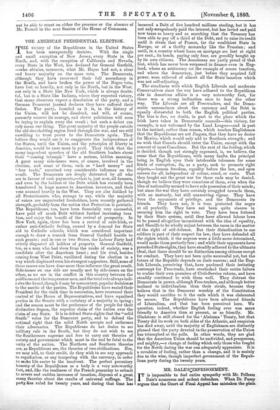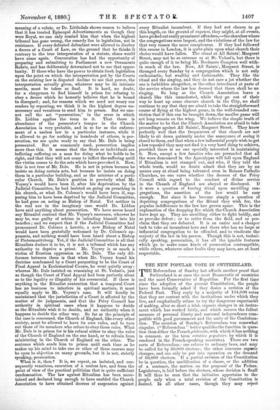MR. DALE'S:IMPRISONMENT. TT is impossible to feel entire sympathy with
Mr. Pent= I Dale's numerous and ardent defenders. When Dr. Posey argues that the Court of Final Appeal has mistaken the plain
meaning of a rubric, or Dr. Littledale shows reason to believe that it has treated Episcopal Advertisements as though they were Royal, we can only remind him that when the highest tribunal has gone wrong, the remedy lies in legislation, not in resistance. If every defeated defendant were allowed to disobey a decree of a Court of Law, on the ground that he thinks it contrary to the true interpretation of a statute, chaos would have come again. Convocation has had the opportunity of preparing and submitting to Parliament a new Ornaments Rubric, and has deliberately determined not to use that oppor- tunity. If those who have the power to obtain fresh legislation upon the point on which the interpretation put by the Courts on the existing law is disputed decline to use that power, the interpretation actually given, whatever may be its intrinsic
merits, must be taken as final. It is hard, no doubt, for a clergyman to find himself in prison for refusing to obey a decree which he honestly believes that he is bound to disregard ; and, for reasons which we need not weary our readers by repeating, we think it in the highest degree un- necessary and vexatious to send him to prison. But we can- not call the act " persecution," in the sense in which Dr. Liddon applies the term to it. That there is abundance of the persecutor's temper in the Church Association is very probable, and in so far as the enforce- ment of a useless law in a particular instance, while it is allowed to go for nothing in hundreds of others, is per- secution, we are quite ready to say that Mr. Dale is being persecuted. But as commonly used, persecution implies more than this. It means that the State or individuals are inflicting suffering on a man for doing what he holds to be right, and that they will not cease to inflict the suffering until the victim ceases to do the acts which have provoked it. Now, this is not true of Mr. Dale. He is not in prison because he insists on doing certain acts, but because he insists on doing them in a particular building, and as the minister of a parti- cular Church. Mr. Dale's position is precisely what Mr. Voysey's would have been if, after his deprivation by the Judicial Committee, he had insisted on going on preaching in his church, or what Dr. Colenso's would have been if, sup- posing him to have been deprived by the Judicial Committee, he had gone on acting as Bishop of Natal. Yet neither in the real nor in the imaginary case would Dr. Liddon have said anything about persecution. We have never heard any Ritualist contend that Mr. Voysey's successor, whoever he maybe, was guilty of schism in intruding himself into his benefice ; and we suspect that if the Judicial Committee had pronounced Dr. Colenso a heretic, a new Bishop of Natal would have been gratefully welcomed by Dr. Colenso's op- ponents, and nothing would have been heard about a Bishop of Pietermaritzburg. Yet, if the Judicial Committee is all that Ritualists declare it to be, it is not a tribunal which has any authority to deprive a priest. Mr. Voysey is as much a victim of Erastian oppression as Mr. Dale. The only dif- ference between them is that when Mr. Voysey found his doctrine condemned by a Court purporting to be the Court of Final Appeal in Ecclesiastical Causes, he went quietly away ; whereas Mr. Dale insisted on remaining at St. Vedast's, just as though the Court of Final Appeal had been perfectly silent as to the legality or illegality of his ceremonial. If there is anything in the Ritualist contention that a. temporal Court has no business to interfere in spiritual matters, it must equally apply to Mr. Voysey's case. It will hardly be maintained that the jurisdiction of a-Court is affected by the matter of its judgments, and that the Privy Council has authority in spiritual cases when it happens to decide as the Ritualists wish it to decide, and no authority when it happens to decide the other way. So far as the principle of the case is concerned, the Church of England, like every other society, must be allowed to have its own rules, and to turn out those of its members who refuse to obey those rules. What Mr. Dale is in prison for is his refusal either to obey the rules of the Church of England on the one hand, or to refrain from ministering in the Church of England on the other. The sentence which sends him to prison until such time as he makes up his mind to take one or other of these courses may be open to objection on many grounds, but it is not, strictly speaking, persecution.
What is it, then 4 It is, we repeat, an isolated, and con- sequently vexatious, execution of a useless law, and from the point of view of the practical politician that is quite sufficient condemnation. The law against Ritualism has been ascer- tained and declared long enough to have enabled the Church Association to have obtained decrees of suspension against
every Ritualist incumbent. If they had not chosen to go this length, on the ground of expense, they might, at all events, have picked out really prominent offenders,—the churches where the congregations were largest, and the violations of the law for that very reason the more conspicuous.. If they had followed this course in London, it is quite plain upon what church their choice would have fallen. The ritual at All Saints', Margaret Street, may not be so extreme as at St. Vedast's, but there is quite enough of it to bring Mr. Berdraore Compton well with- in reach of the law. Now, All Saints', Margaret Street, is thronged every Sunday by a congregation which is not only enthusiastic, but wealthy and fashionable. They like the ritual and the singing, and they do not care a jot whether the one is forbidden altogether, or the other introduced at parts of the service where the law has decreed that there shall be no singing. So long as the Church Association leave a church like this unmolested, while they go out of their way to hunt up some obscure church in the City, we shall' continue to say that they are afraid to take the straightforward course of flying at the highest game, in the well-founded con- viction that if this can be brought down, the smaller game will not long remain on the wing. We believe the simple truth of the matter to be that the Church Association are afraid to take proceedings against All Saints', Margaret Street. They know perfectly well that the frequenters of that church are not• likely to sit down patiently under the annoyance of seeing it closed to them, and that when a few influential people wish to get a law repealed they may not find it a very hard thing to achieve, provided there is no one specially interested in maintaining it. Now, except a few fanatics who are persuaded that all the woes denounced in the Apocalypse will fall upon England if Ritualism is not stamped out, and who, if they told the whole truth, would no doubt admit that they are by no means easy at ritual being tolerated even in Roman Catholic Churches, no one cares whether . the decrees of the Privy Council with regard to the conduct of divine service in the Church of England are obeyed or disobeyed. If it were a question of forcing ritual upon unwilling con- gregations, the assertion of the law would be easy enough. But since it has become simply a question of depriving congregations of the Ritual they wish for, the popular indifference to the law has grown apace. This is the explanation of the dropping fire which the Church Association have kept up. They are unwilling either to fight boldly, and so provoke defeat ; or to retire from the field, and so pro- claim that they are defeated. It is an easier and a cheaper task to take an incumbent here and there who has no large or influential congregation to be offended, and to vindicate the majesty of the law in his person. Though this is not, techni- cally speaking, perseCution, it has all the ignoble features which 'go to make some kinds of persecution contemptible, while others, whatever other faults they may have, are at least respectable.



































 Previous page
Previous page